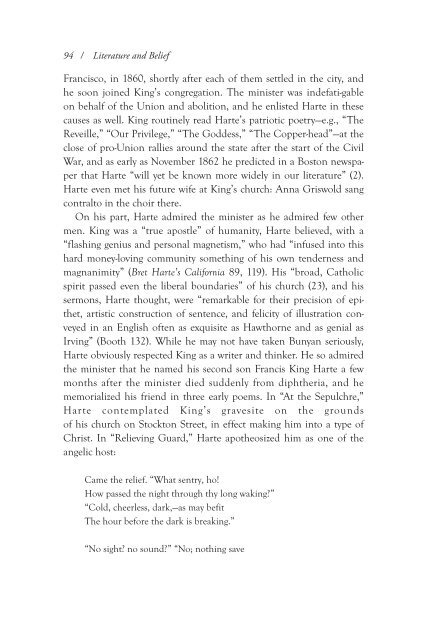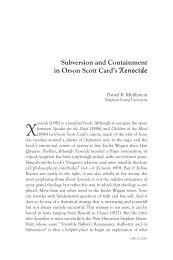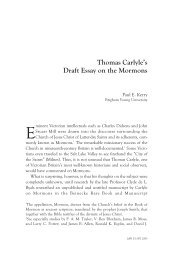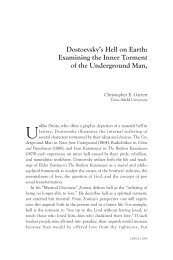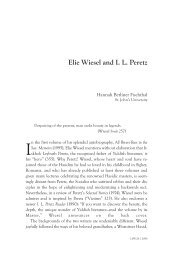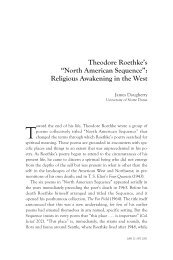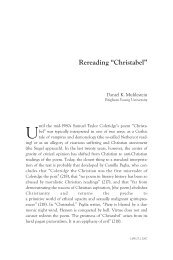Bret Harte, Unitarianism, and the Efficacy of Western Humor
Bret Harte, Unitarianism, and the Efficacy of Western Humor
Bret Harte, Unitarianism, and the Efficacy of Western Humor
Create successful ePaper yourself
Turn your PDF publications into a flip-book with our unique Google optimized e-Paper software.
94 / Literature <strong>and</strong> Belief<br />
Francisco, in 1860, shortly after each <strong>of</strong> <strong>the</strong>m settled in <strong>the</strong> city, <strong>and</strong><br />
he soon joined King’s congregation. The minister was indefati-gable<br />
on behalf <strong>of</strong> <strong>the</strong> Union <strong>and</strong> abolition, <strong>and</strong> he enlisted <strong>Harte</strong> in <strong>the</strong>se<br />
causes as well. King routinely read <strong>Harte</strong>’s patriotic poetry—e.g., “The<br />
Reveille,” “Our Privilege,” “The Goddess,” “The Copper-head”—at <strong>the</strong><br />
close <strong>of</strong> pro-Union rallies around <strong>the</strong> state after <strong>the</strong> start <strong>of</strong> <strong>the</strong> Civil<br />
War, <strong>and</strong> as early as November 1862 he predicted in a Boston newspaper<br />
that <strong>Harte</strong> “will yet be known more widely in our literature” (2).<br />
<strong>Harte</strong> even met his future wife at King’s church: Anna Griswold sang<br />
contralto in <strong>the</strong> choir <strong>the</strong>re.<br />
On his part, <strong>Harte</strong> admired <strong>the</strong> minister as he admired few o<strong>the</strong>r<br />
men. King was a “true apostle” <strong>of</strong> humanity, <strong>Harte</strong> believed, with a<br />
“flashing genius <strong>and</strong> personal magnetism,” who had “infused into this<br />
hard money-loving community something <strong>of</strong> his own tenderness <strong>and</strong><br />
magnanimity” (<strong>Bret</strong> <strong>Harte</strong>’s California 89, 119). His “broad, Catholic<br />
spirit passed even <strong>the</strong> liberal boundaries” <strong>of</strong> his church (23), <strong>and</strong> his<br />
sermons, <strong>Harte</strong> thought, were “remarkable for <strong>the</strong>ir precision <strong>of</strong> epi<strong>the</strong>t,<br />
artistic construction <strong>of</strong> sentence, <strong>and</strong> felicity <strong>of</strong> illustration conveyed<br />
in an English <strong>of</strong>ten as exquisite as Hawthorne <strong>and</strong> as genial as<br />
Irving” (Booth 132). While he may not have taken Bunyan seriously,<br />
<strong>Harte</strong> obviously respected King as a writer <strong>and</strong> thinker. He so admired<br />
<strong>the</strong> minister that he named his second son Francis King <strong>Harte</strong> a few<br />
months after <strong>the</strong> minister died suddenly from diph<strong>the</strong>ria, <strong>and</strong> he<br />
memorialized his friend in three early poems. In “At <strong>the</strong> Sepulchre,”<br />
<strong>Harte</strong> contemplated King’s gravesite on <strong>the</strong> grounds<br />
<strong>of</strong> his church on Stockton Street, in effect making him into a type <strong>of</strong><br />
Christ. In “Relieving Guard,” <strong>Harte</strong> apo<strong>the</strong>osized him as one <strong>of</strong> <strong>the</strong><br />
angelic host:<br />
Came <strong>the</strong> relief. “What sentry, ho!<br />
How passed <strong>the</strong> night through thy long waking?”<br />
“Cold, cheerless, dark,—as may befit<br />
The hour before <strong>the</strong> dark is breaking.”<br />
“No sight? no sound?” “No; nothing save


